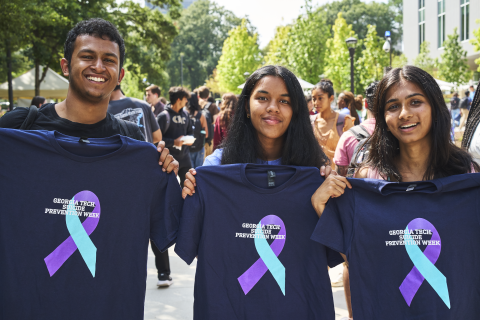Suicide Prevention Week is a national movement aimed at bringing awareness to this leading cause of death and inspiring people in their communities to learn how they can play a role in helping save lives. At Georgia Tech, we are asking the campus to come together for a week of events designed to support our students' mental health and provide everyone in our community with the tools they need to help others.
Nobody is alone at Georgia Tech — even in moments of loneliness, feeling overwhelmed, being immobilized by fear, or believing that one cannot go on. This is the message behind Georgia Tech’s Suicide Prevention Week, taking place from Sept. 9-13. The campus community is invited to come together to support each other, understand mental health, and learn how to help prevent loss of life to suicide.
“Many individuals who experience thoughts of suicide experience loneliness. It's one of the major risk factors for suicide. This year's theme, Nobody Walks Alone, was chosen to bring awareness to this experience of loneliness and to help our students know that they do not have to go at it alone and there are many allies and resources on campus,” said Dr. Andrew Stochel, Psychologist and QPR Coordinator in the Georgia Tech Center for Mental Health Care and Resources.
A 2024 study conducted by Active Minds confirmed the correlation between loneliness and poor mental health outcomes. Key findings indicated that nearly 65% of college students report feeling lonely, and that students who feel this way are over four times more likely to experience severe psychological distress.
“Suicide prevention is important to college campuses, as young adults are a population at particular risk for suicide,” Dr. Stochel said. “The struggles of adjusting to college, taking on more responsibility as a young adult, and pursuing academic success are very challenging when they are all put together and place students at increased risk for suicide and mental health difficulties.”
The events taking place throughout Suicide Prevention Week are designed to help students through these challenges by providing education and tools to promote resilience and encourage community. Events will include the Send Silence Packing exhibit, QPR trainings, “speed friending” (think speed dating, but for friends!), and more activities to help students engage with others, connect to campus resources, and learn about ways to reduce their risks and improve their overall well-being in all Eight Dimensions of Wellness.
One of the hallmarks of Georgia Tech’s Suicide Prevention Week is QPR training. QPR stands for Question, Persuade, and Refer, which are three simple steps anyone can learn to help prevent suicide. This is one of the easiest ways the campus community can help support those who are struggling with their mental health.
“The skills you learn in QPR training can be used in a lot of situations, whether a person is stressed or distressed,” said Carrie Shepler, QPR Instructor and Assistant Dean for Teaching Effectiveness in the School of Chemistry and Biochemistry. “In a situation where someone does have suicidal ideation, it’s important to recognize that I am absolutely not qualified to fix the issues that lead to those thoughts. Instead, it's about finding my role in that situation and helping find people who are qualified to help. My job is to get them to the people that can help and to let them know that I care.”
Offering QPR training both virtually and on campus is just one of many ways that Georgia Tech demonstrates its commitment to cultivating well-being. Student Engagement and Well-Being (SEWB) supports this initiative by offering programs, services, and events designed to encourage students’ holistic well-being through the Cultivate Well-Being Action and Transformation Roadmap for Students.
“Georgia Tech is also examining how our institutional culture offers both protective factors for mental health, as well as barriers. For example, reducing the amount of suicide contagion can help minimize triggers for students,” observes Luoluo Hong, Vice President for Student Engagement & Well-Being. “In addition, we want to rethink how we can support excellence and celebrate achievement without generating toxic positivity or an unhealthy emphasis on exceptionalism. The reality is that the path to success is often paved with failures – that is how we can learn to grow and thrive.”
Additional mental health resources are listed on the Center for Mental Health Care and Resources website. Students also have access to four free virtual counseling sessions per year without a referral through Georgia Tech’s partnership with Uwill, a third-party provider of supplemental resources and services.
Students who are experiencing significant mental health difficulties and need immediate support can call the Center for Mental Health Care and Resources at 404.894.2575 or visit Suite 238 in the Smithgall Student Services Building during business hours (Monday through Friday 8 a.m.-5 p.m.). After-hours support is available through the same phone number by selecting the option for the after-hours counselor. In an emergency, call Georgia Tech Campus Police at 404.894.2500 on campus or 911 off campus.
Additional sponsoring departments for Suicide Prevention Week include: Campus Recreation, Center for Student Engagement, Center for Teaching and Learning, Office of Graduate and Postdoctoral Education, Stamps Health Services, STAR Services, and the Wellness Empowerment Center. Other sponsoring organizations include Active Minds, Campus QPR Instructors, MEDLIFE, and the Student Government Association Mental Health Student Coalition.
The full list of Suicide Prevention Week events can be found on the Center’s website.
